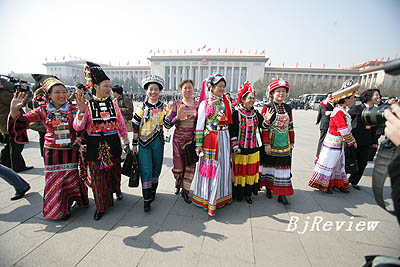|

With the opening of the First Session of the 11th National People's Congress (NPC), China's top legislature, the newly elected deputies to the 11th NPC have begun performing their duties.
The 2,987 new deputies were elected from 34 of China's regions and the People's Liberation Army. The composition of the new deputies changes greatly when compared with the 10th NPC, indicating that the country's top legislature is giving the grassroots more seats.
The number of worker and farmer deputies is increasing.
In the list of new deputies, the number of frontline worker and farmer deputies is increasing substantially, with frontline workers doubling that of 10th NPC deputies, and the number of farmers rising 70 percent.
It is commonly believed that top legislature should widely gather public opinion, and be a stage for all groups voicing their interests. It needs not only experienced politicians and social celebrities, but also grassroots deputies expressing real concerns of ordinary people.
The number of government official deputies is declining.
Deputies from provincial-level governments are much less than before, dropping by one third compared with the 10th NPC. This means that more seats are given to people from various walks of life.
There are 411 deputies from ethnic minorities, accounting for 13.76 percent of the total. Each ethnic minority has its own deputies, and those with a tiny population have at least one representative.
Female deputies are gaining more seats.
The number of female deputies to the 11th NPC amounts to 637, making up 21.33 percent of the total, or 1.09 percentage points higher than that to the 10th NPC.
The larger proportion of female deputies indicates that more and more women are entering the country's top legislature, which is definitely helpful in protecting the rights and interests of women and, in particular, those of under-representation.
Migrant workers have been elected for the first time.
The 11th NPC deputies also include three migrant workers. They are Zhu Xueqin from the Shanghai delegation, Hu Xiaoyan from the Guangdong delegation, and Kang Houming from the Chongqing delegation.
In recent years the number of migrant workers has been growing steadily and currently totals about 200 million. Migrant workers have made great contributions to China's economic development, thus needing their own representatives voicing and even crying their concerns.
Zhu is a workshop manager at the Shanghai Huari Garment Co. Ltd.
Hu comes from Sichuan and is now a vice manager of a finished product workshop at Guangdong Foshan Sanshui Xinmingzhu Jiantao Industry Co. Ltd.
Kang is a worker at the Chongqing Urban Construction Investment Co.
Deputies with junior college degree or above are the majority.
Current NPC deputies have much higher education qualifications than past NPC deputies, with 92 percent holding junior college degrees or above, and 50 percent holding postgraduate degrees.
Better educational background of the deputies is believed to meet the requirement of efficient governance of the country, which is facing and dealing with social and economic issues much more complicated than ever before.
In addition, among the 11th NPC deputies, there are 35 overseas returnees, 36 from the Hong Kong Special Administrative Region, 12 from the Macao Special Administrative Region and 13 from Taiwan. | 